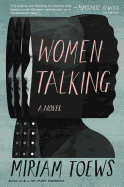
Miriam Toews (All My Puny Sorrows) begins her seventh novel, Women Talking, with a note that the book is both based on a true story and "an act of female imagination." In this tragically relevant yet wryly humorous novel, the women are discussing three options for their futures: (1) do nothing, (2) stay and fight or (3) leave.
Between 2005 and 2009, in a remote Mennonite colony of Canadian émigrés in Bolivia, hundreds of girls and women were raped in their sleep. Ghosts and demons were blamed, but eventually eight men from the colony were found guilty of the assaults.
The novel imagines eight women maximizing the few days when the men are in the city working for the release of the arrested attackers. August Epp, who teaches the colony's male children and is shunned by the men, is the book's narrator, asked to take notes at the hayloft meeting, since women are kept illiterate by the patriarchy. As three generations from two families argue the options, their idiosyncrasies surface. Sisters Mariche and Mejal openly roll and smoke cigarettes; Mejal's teen daughter and her friend frolic on the meeting's edges. Toews tempers the horror of the situation with these antics as the group determines, "We want our children to be safe. We want to keep our faith. And we want to think."
With no knowledge of the world beyond their colony, unable to speak the country's language and few resources, the women of Molotschna are brave for even considering an escape. Toews's imagining of their desperation is a timely story made accessible by her unflinching yet humorous telling. --Cheryl Krocker McKeon, manager, Book Passage, San Francisco

